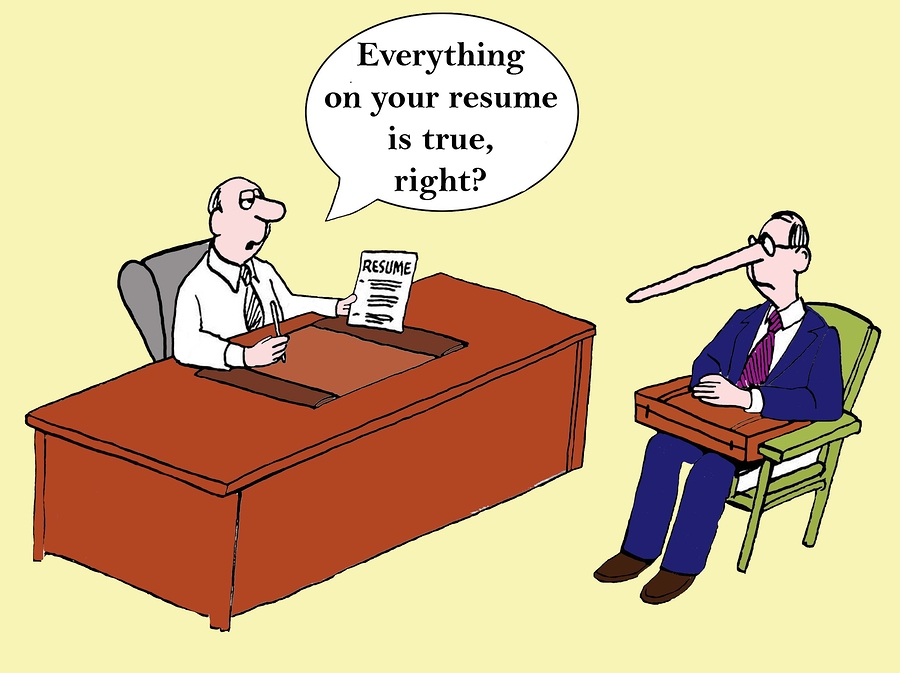Job seekers, if you’re lying on your resume, you will get caught!
People often fudge details when telling a story. It’s normal, right? And it is not too much of a stretch for the odd individual to exaggerate their credentials when it comes to presenting a job application. The desire to land a job role can push some to lie on their resume, but it’s a big risk and chances are you will get caught!
Employers are not naïve. They are alert to the fact that up to 25 per cent of job candidates are lying on their resume. But who is lying and what lies are they telling are the questions hiring managers need to decipher. A common falsehood candidates tell to a prospective employer is that they are earning a higher salary in their current role in an effort to entice a sweeter deal in their potential new role. I believe this is negotiation?
With today’s technology hiring managers have the ability to detect a lie even before they have met the job applicant! A vast number of jobs are applied for online so cross referencing data from the cover letter, to the resume and the selection criteria can reveal a discrepancy. Taking a peek at an applicants LinkedIn profile, Facebook page or even the results of a common Google search can identify some to be bending the truth. And don’t believe for a moment that recruiters aren’t engaging these tactics. Their job isn’t to simply source fresh talent, but to also minimise risk. Even the smallest of white lies can raise enormous red flags and put an end to the progression of your career with your firm of choice.
Needless to say the risks of lying of your resume are BIG! The tiniest fabrication, such as filling an employment gap by extending your length of a previously held position, to stating that you have completed a degree when in fact you have not, is all that it takes to sabotage your career. Being caught in a lie speaks to your credibility. And not in a good way! Missing a job opportunity on merit is one thing, but damaging your reputation or being fired once the truth is revealed is too great a risk.
Typically job seekers are embellishing truths about their educational achievements, their skill proficiencies and dates of employment. Commonly employers are using skills assessments, social media searches and background checks to confirm credentials and catch out the less than honest candidate. So beware job seekers, if you’re vague about your skills and your body language betrays you (very few of us are gifted liars!) then a simple skills test is going to see your fraudulent spiel unravel. Even a carefully conspired reference list can undo you. Some additional digging through mutual connections can very quickly expose your fabricated story telling.
Clearly honesty is the best policy. And while this may seem a terrifying strategy in light of the fact that you and your most recent employer did not leave on the friendliest of terms, remember that there is always two sides to a story. So unless you embezzled thousands of dollars from your previous employer, you can probably find a way to voice your negative experience without jeopardising your opportunity of being hired. Not all relationships end on a positive note. Employers are savvy to this fact. And while you may not want to lead with a negative account of your employment history, be prepared with a response should any awkward questions arise. Why were you dismissed from your last position? You had a personality clash with your employer who continuously applied a different set of rules to you until they forced you out the door? Ok, but what about everything that you achieved while you were there? You know, the procedures you put in place that advanced the company, escalating their position in the market. There is generally a silver lining to every unfortunate event. And integrity is a highly admirable quality. Just remember not to bad mouth your former boss.
With heightened scrutiny being applied to the recruitment process, lies and omissions can quickly be identified and see you struck off the list of potential job candidates. Strangely, lies can also land you the job. But having talked the talk, you will have to walk the walk once hired. So be careful how you present yourself, at all stages of the recruitment process. If you think scrutiny of your performance ceases once you commence your new position, think again! What may be a calculated risk to you may be an unforgivable act from the viewpoint of your employer and co-workers. So before you go ‘fudging’ the truth on your resume, ask yourself, can you really afford to rejoin the unemployment queue with the label of a liar over your head?








